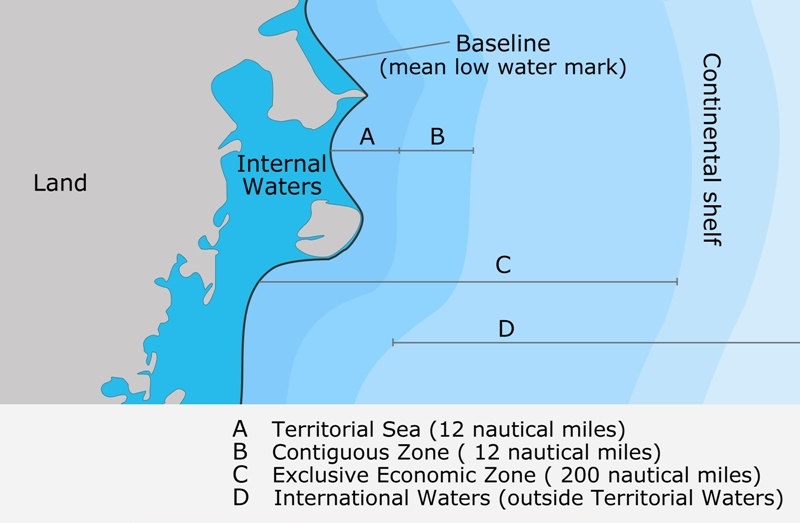Internal waters are ‘those waters which lie landward of the baseline from which the territorial sea is measured’. Specifically, internal waters in a legal sense embrace (i) parts of the sea along the coast down to the low-water mark, (ii) ports and harbours, (iii) estuaries, (iv) landward waters from the closing line of bays, and (v) waters enclosed by straight baselines. On the other hand, as noted earlier, internal waters in the law of the sea do not include waters within the land territory and land-locked waters or lakes.
The seaward limit of internal waters is determined by a baseline from which the territorial sea is measured. The baseline becomes the landward limit of the territorial sea. Accordingly, internal waters are bound by the territorial sea of the coastal State. An exception is the case of archipelagic States. As will be seen, archipelagic States may draw lines limiting their internal waters across the mouths of rivers, bays and ports only within their archipelagic waters. In this case, the internal waters are bound by the archipelagic waters, not by the territorial sea.
also According to the United Nations Convention on the Law of the Sea, a nation’s internal waters include waters on the side of the baseline of a nation’s territorial waters that is facing toward the land, except in archipelagic states. It includes waterways such as rivers and canals, and sometimes the water within small bays.
In inland waters, sovereignty of the state is equal to that which it exercises on the mainland. The coastal state is free to make laws relating to its internal waters, regulate any use, and use any resource. In the absence of agreements to the contrary, foreign vessels have no right of passage within internal waters, and this lack of right to innocent passage is the key difference between internal waters and territorial waters.[2] The “archipelagic waters” within the outermost islands of archipelagic states are treated as internal waters with the exception that innocent passage must be allowed, although the archipelagic state may designate certain sea lanes in these waters.
When a foreign vessel is authorized to enter inland waters, it is subject to the laws of the coastal state, with one exception: the crew of the ship is subject to the law of the flag state. This extends to labor conditions as well as to crimes committed on board the ship, even if docked at a port. Offences committed in the harbor and the crimes committed there by the crew of a foreign vessel always fall in the jurisdiction of the coastal state. The coastal state can intervene in ship affairs when the master of the vessel requires intervention of the local authorities, when there is danger to the peace and security of the coastal state, or to enforce customs rules.

